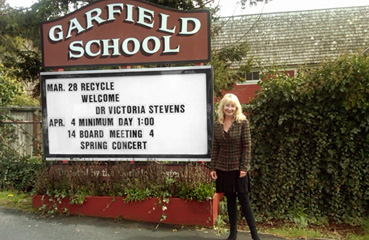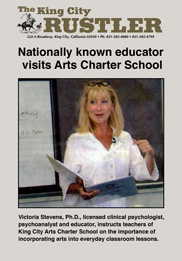
|
|

|
|
The function of the imagination is not to make strange things settled, so much as to make settled things strange. ~G.K. Chesterton
Bureaucrats call it "emancipation," but for foster kids there’s no worse birthday by D. HEIMPEL Published in the LA WEEKLY January 10, 2008 Victoria Stevens, a Los Angeles psychologist who has studied the effects of the foster-care system on younger children, explains that if a child is in a stable environment, his or her brain development is affected accordingly. In a stable setting, connections between the neurons in the brain grow at a healthy pace, allowing for higher-level mental processes — like learning abstract mathematical or scientific concepts. "In cases of disrupted and insecure attachment, the lower brain processes become dominant and higher-order cognitive skills and social skills can become impaired," Stevens says. Many foster-care kids have trouble reading, and struggle with other basic skills, because their "attention span is hijacked by emotions."
Published in the LA WEEKLY Victoria Stevens, a Los Angeles psychologist who has worked extensively with foster youth, agrees in principal, saying, the "race of parents, sexual orientation, socioeconomic status, education of the parents, single parents, et cetera, is of little or no consequence." The key is "the capacity of the caregiver to pay attention to the separate existence of the child and respond contingently with care, delight, love, respect, play, predictability and consistency." |
December 10, 2013 Two sessions for the Anni Bergman Infant-Parent Training Program: The Intersection of Psychoanalytic Theories of Infant Development with Interpersonal Neurobiology. For graduates of IPTAR (The Institute for Psychoanalytic Training and Research) and the New York Freudian Society, New York, NY.
Co-Trainer with Lindon Crow – we will be using your feedback we develop a set of personalized processes just for you and your "now" life situations before your departure. There's no limit to the type of material that could be covered. Because this accelerated learning course is limited to a small group, each participant will have the opportunity for more in-depth interactions with trainers, as well as private one-on-one consultations to ensure clarity and completion before arriving back home from your adventure in learning about yourself.
CTL Academy, Abuja, Nigeria CTL Academy Abuja offers an American standards-based curriculum delivered from a global perspective. CTL Academy attracts families seeking rigorous academics, a whole child philosophy, and a warm and nurturing environment for their children. Our comprehensive program is designed to produce students with their own unique balance of Global Citizen, Servant Leader, and Passionate Scholar. CTL Academy Curriculum:
CTL Academy defines "international education" according to the following criteria:
July 15-28, 2013 Millennium Charter High School, Monterey, CA Mission and Vision The best employers the world over will be looking for the most competent, most creative, and most innovative people on the face of the earth and will be willing to pay them top dollar for their service…. Beyond [strong skills in English, mathematics, technology, and science], candidates will have to be comfortable with ideas and abstractions, good at both analysis and synthesis, creative and innovative, self-disciplined and well organized, able to learn quickly and work well as a member of a team and have the flexibility to adapt quickly to frequent changes in the labor market as the shifts in the economy become ever faster and more dramatic. – The New Commission on the Skills of the American Workforce, 2007, cited in Darling-Hammond, 2010. The Millennium Charter High School is an innovative new school designed for 9th-12th grade students with the goal of facilitating the development of the kinds of skills, mastery of knowledge and ways of thinking that will enable them to emerge upon graduation as informed, educated citizens, leaders inside and outside of their community and prepared to succeed in the global economy of the 21st century. The learning environment and curriculum are based on learning in the arts and technology, which are integrated and incorporated into learning in all other curricular areas. In all, the curriculum developed by Dr. Victoria Stevens focuses on the development of skills and knowledge in five main curricular areas all of which are considered core subjects and all of which intersect:
All subjects in the five (1-5 above) curricular areas will have their own focus and sequence as well as intersecting in terms of thematic content and interdisciplinary cross-connections and are all taught through inquiry and project-based learning. In addition all five areas are linked by common larger goals and outcomes that are considered to be essential for success in a rapidly changing world. These are often called 21st Century Skills and include those listed in the above quotation at the opening of this paper. These skills include: creative thinking, imagination, mental play, critical thinking, learning how to learn, self-reflection, empathy, collaborative teamwork, analogical and metaphorical thinking, patience, emotional self-regulation and self-motivation. To prepare students for success, Millennium Charter High School emphasizes inquiry-based and project-based learning, which allows students to delve deeply into course material, develop critical and creative thinking skills, work collaboratively and develop mastery in their own unique areas of interest. Millennium Charter High School recognizes that each student possesses his or her own unique ways of learning and has different levels of skill, areas of giftedness and unique life-goals. Millennium Charter High School is committed to developing different types of literacy in all students: aesthetic, informational, intellectual, emotional, social, and ethical, all of which are essential to an educational process having the aim of providing students with a sense of personal purpose and the life-long learning skills for success in college, in any area of work, and for citizenship, locally and globally.
January 2013 - Gompers Middle School & Fremont High School February 5, 2013 - Markham Middle School, LAUSD February 13, 2013 - Academy for Multilingual Arts and Sciences (AMAS), South Region High #12 March 12, 2013 - Gompers Middle School March 19, 2013 - Florence Griffith Joyner Elementary School May 4, 2013 - Los Angeles Unified School District
CUN Mentors who complete this required training will recieve a certificate of completion by Victoria Stevens, Ph.D., Clinical Psychologist and Certified Trainer.
CONTINUING EDUCATION COURSES – PASADENA/LA AREA Reserve Now – Space is Limited | Download Registration Form | Email or Call: (714) 505-9080 Listening to Non-Verbal Communication: The Music, Dance and Poetry of Language Instructor: Victoria Stevens, Ph.D. Dates: 3 Saturdays, February 23, March 2 and March 9, 10:00 AM – 1:00 PM Cost: $180, 9 CE/CEUS (Must attend all sessions for CE/CEUS) Location: The office of Victoria Stevens, Ph.D. 10845 Lindbrook Drive #206 Los Angeles, CA 90024 (Westwood Village near UCLA) Course Description: This class will cover major ideas of creativity as they relate to the work of psychotherapy, including ideas from affective neurobiology and interactive regulation. There will be a focus on all modalities of non-verbal communication through the body and voice as well as the poetry of the unconscious as it reveals itself through everyday language. Actual ear-training and musical improvisation, theatre and dance improvisation and examples from visual art, poetry and literature will also be utilized. This information and these experiences will be related to current or past cases of the participants, Course Objectives: 1. Participants will learn basic theories of creativity as they relate to psychotherapeutic and psychoanalytic work with patients of all ages 2. Participants will be able to have their own creative thinking enhanced as well as that of their patients 3. Participants will learn to “read” non-verbal modalities of communication through basic experiences in all art forms. 4. Participants will be able to apply this information to their own work to expand their listening and interpretation skills
|

VIDEO - April 2010: Region V Visual & Performing Arts CCESSA Sponsored Forum with Dr. Victoria Stevens: How Arts Education Can Support Student Achievement in Our Region. Host: Media Center for Art, Education and Technology Location: Museum of Art & History at the McPherson Center, Santa Cruz, CA  READ ALL ABOUT IT! – Victoria Stevens, Ph.D., licensed clinical psychologist, psychoanalyst and educator, instructs teachers of King City Arts Charter School on the importance of incorporating arts into everyday classroom lessons.
Art on the Brain The following are links to QuickTime videos. Click here to download for free, the latest version of QuickTime Player. Art on the Brain Part 1 of 2 (13:53) Art on the Brain Part 2 of 2 (14:50) In March of 2008, Dr. Stevens presented a talk for arts organizations, teachers, parents, and business leaders about the importance of arts education for all children sponsored by the Forest Theatre Guild, Carmel-By-The-Sea in Carmel, CA. This was a prelude to her talk the next day for the Region 5 Arts Education Forum sponsored by the Santa Cruz County Office of Education entitled: "Open the Doors to Arts Education". The topic of her Keynote Address was "Creativity, Empathy, Imagination and Metacognition: What Affective Neurobiology Tells Us about the Importance of Arts Education for All Children." |
©2008-13 Victoria Stevens • All rights reserved
